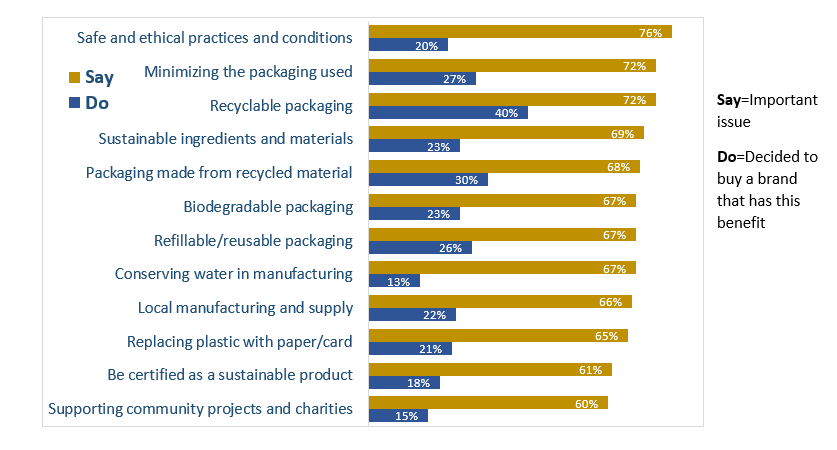Better brand, better world: Alpha Foods CMO Kierstin De West on the opportunity in helping people become more conscious consumers
By Andrew Grenville, Chief Research Officer, Maru/Matchbox North America | November 29, 2021
Brands can play a key role in helping consumers make sustainable choices
Sustainability may be hot these days because of climate change, but it is a subject that has been simmering away for many years. Kiersten De West has been leading the charge for greater sustainability for over 20 years, first as the founder and Chief Executive Officer of consultancy Conscientious Innovation, then as Lululemon’s Vice President Global Brand Management and Strategy, and now as Chief Marketing Officer of Alpha Foods—a plant-based food producer. She feels sustainability is undersold and that there is incredible opportunity in helping people achieve the sustainability they aspire to.
De West believes in making a difference. “Better brand, better world” has been her “north star” for many years. In a session at the We Better Behave conference, she shared with me her thoughts on where sustainability is headed, who is doing it well, and who has missed the mark.
Mind the gap
Our research reveals that, in terms of acting sustainably, there is a large gap between what people aspire to and what they do. When we compare stated concern about sustainability issues to actual behavior, we see just how wide the gulf is. Consumers consistently state high concern, but generally fail to translate that into brand choices.
The say/do gap in sustainability
The difference between what consumers say is important and the choices they make
De West says consumers are yearning to close the gap, and that this is an opportunity for organizations. “People say, ‘Help me be a conscious consumer. I want to do [the right thing], but it's really hard actually. Help me do that.’” This presents an important opening for manufacturers—an opportunity to help them be the conscious consumer they aspire to be.
She finds some companies that are acting sustainably are reticent to share their actions with consumers. They are failing to communicate their efforts effectively, to the detriment of both their customers and their organizations.
Missing an opportunity
She stated that the biggest misstep she has seen was brands fearing to tell their sustainability story and the positive actions they had taken for fear of not being perfect. As a result, they missed a market opportunity to connect with consumers on a topic that influences their behavior.
“You'd have executives feeling ‘We can't talk about sustainability because of all the things we're not doing.’ The reality is that consumers don't expect Mother Teresa, but they do want honesty. They want transparency, they want credibility, and they don't want philosophy in vague statements. They want the backup for the statements, and they want to be brought along on the journey.”
“We know that most people say, ‘I want to know about the social response of brands whose products and services I buy. And if I'm going to believe you, I want to see these three things: credibility, specificity, and local impact.’”
Doing good
Asked to name a company whose sustainability efforts she has been impressed by, De West cited Unilever. She said a couple of decades ago, Unilever wasn't the brand you looked to as an icon of ‘better brand, better world’ and doing things right. Since then, Paul Pullman, the former chief executive officer, drove a lot of change. First implementing the Unilever Sustainable Living Plan in 2010, Unilever pioneered meaningful change throughout the organization—even moving away from short-term quarterly financial reporting because it undercut a focus on long-term sustainability.
“I think they deserve a lot of credit for having a massive ship and making it change directions significantly,” she said. “That led the industry and really helped people fulfill this desire [to act sustainably] that we saw loud and clear.”
What’s next
De West believes sustainability is increasingly about more than just the environment. Sustainability has four pillars which she says are: social, personal, spiritual, and environmental. She believes it is easy for firms to focus solely on the environment, and in doing so miss the mark. These four aspects of sustainability are inextricably intertwined and failing to recognize that limits the effectiveness of sustainability efforts. In fact, De West thinks the personal elements of sustainability are increasingly important and are the way of the future. For brands to be successful they will have to incorporate these elements in both their actions and marketing efforts.
“People are saying, ‘How can we save the environment if we can’t even save ourselves?’ Right now, we’re seeing these public conversations around personal sustainability—mental health and mental wellness. I think that that is going to be the focus for the next few years: how brands are supporting personal sustainability. Environmental sustainability really must become the cost of entry. We'll be seeing the up-leveling of these other pillars of sustainability.”
Helping consumers close the say/do gap between the sustainable behaviors they wish to adopt and the actions they take is an opening for organizations to both build their brand and contribute to consumers’ personal sustainability. To learn more about how Americans feel, behave, and think regarding sustainability, download our whitepaper Harnessing sustainability in CPG. A U.K. edition is available here.
We at Maru firmly believe “better brand, better world” is a credo that will drive business growth and build a better tomorrow. Here’s to a sustainable future!
To view Kiersten De West’s session and the entire We Better Behave! content on demand, visit https://webetterbehave.live/agenda/.


